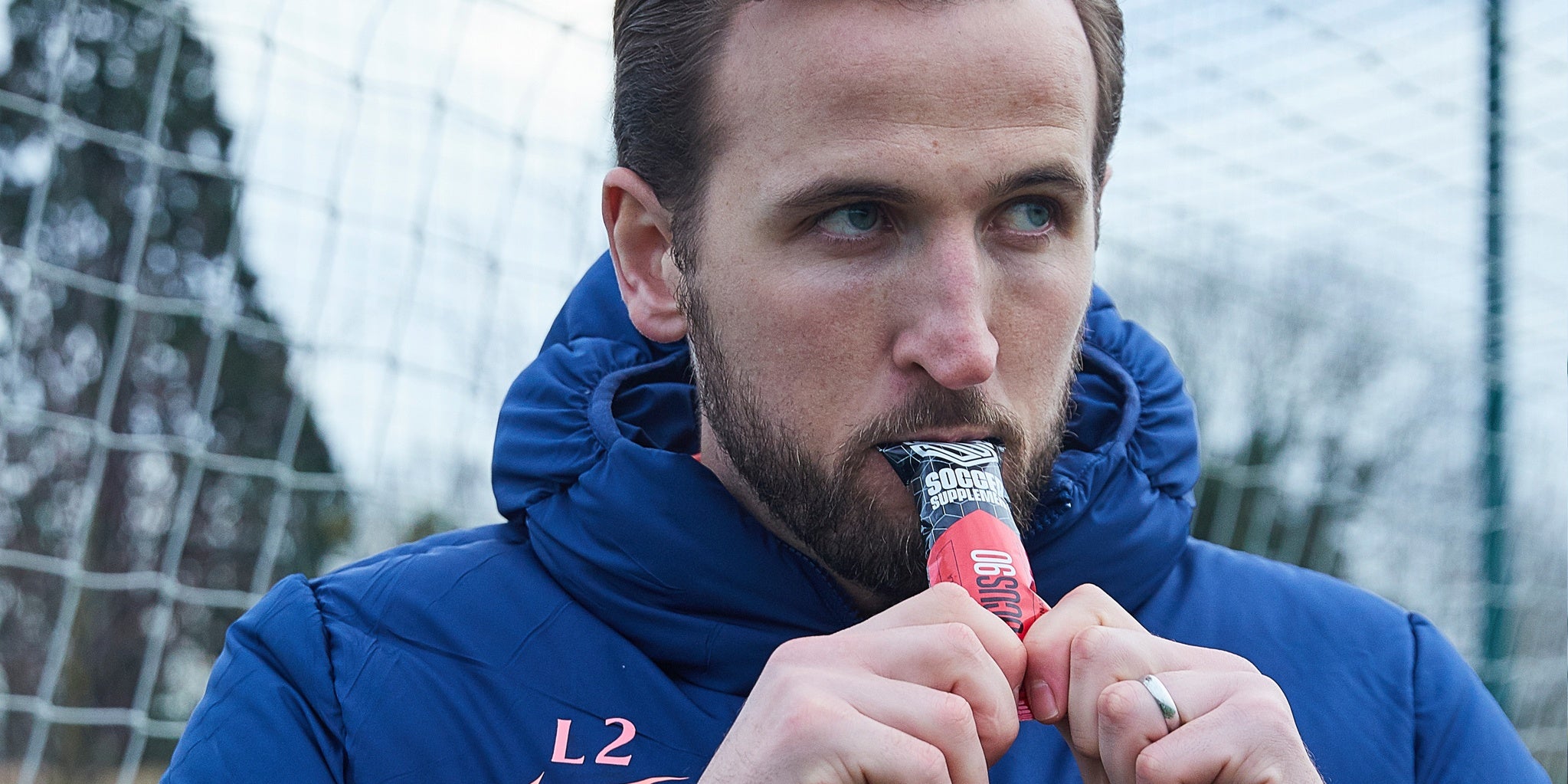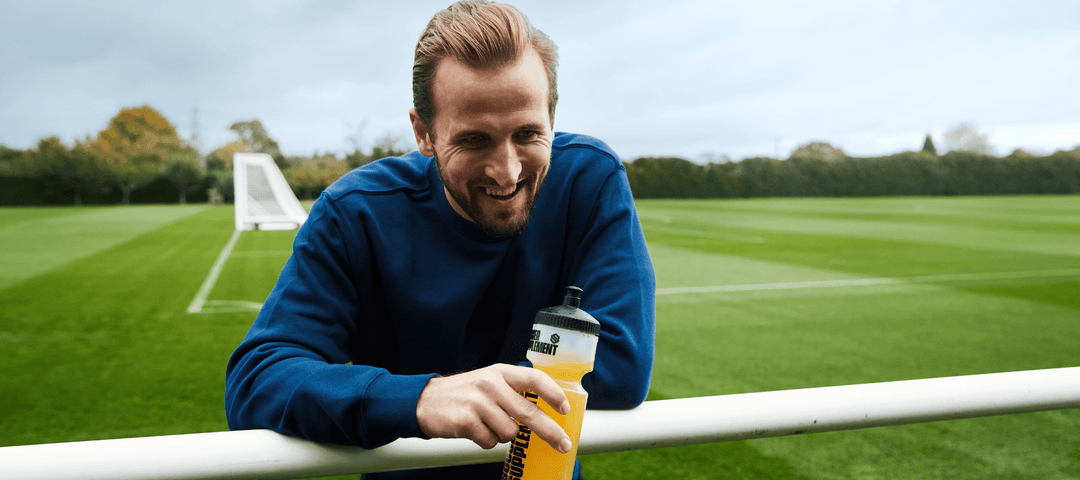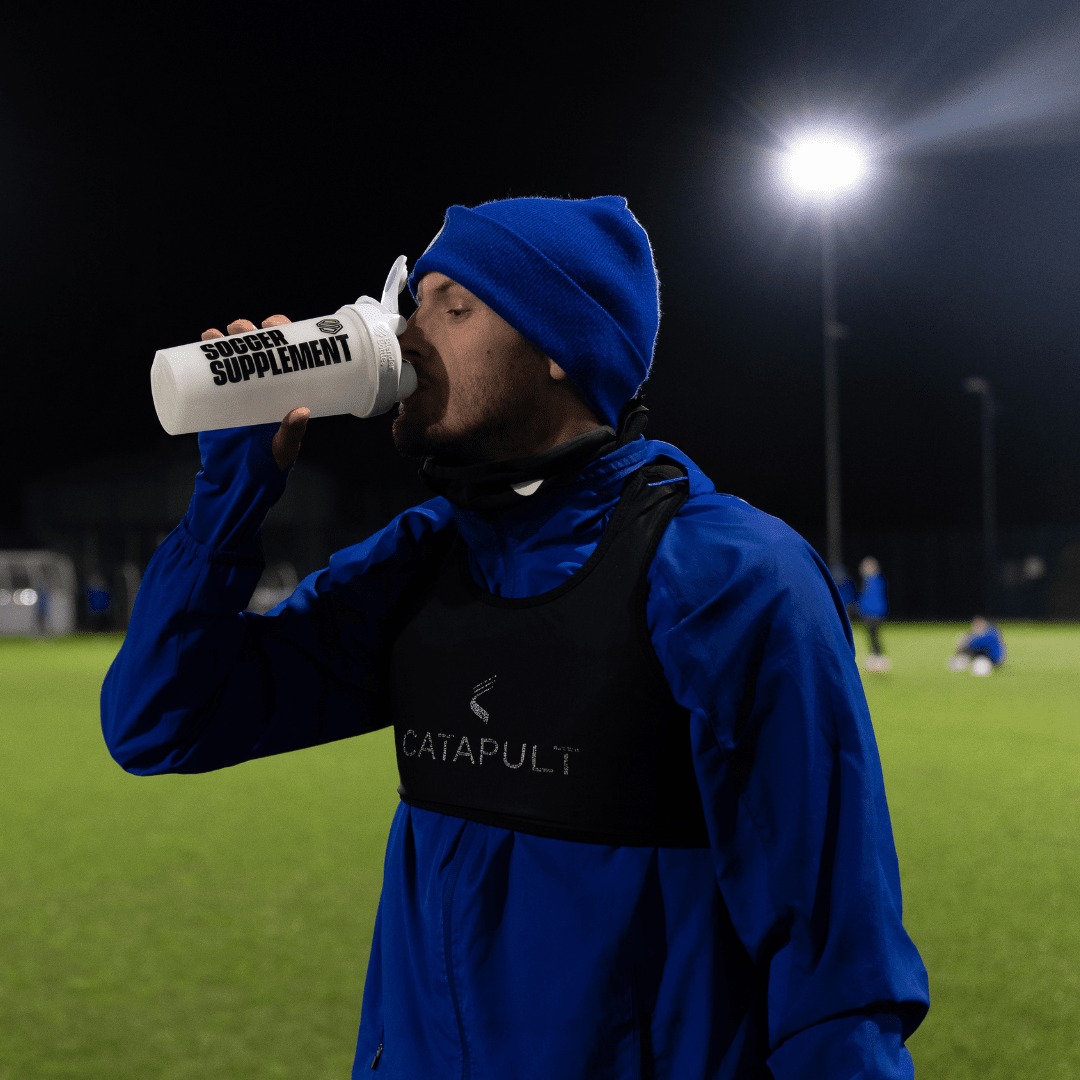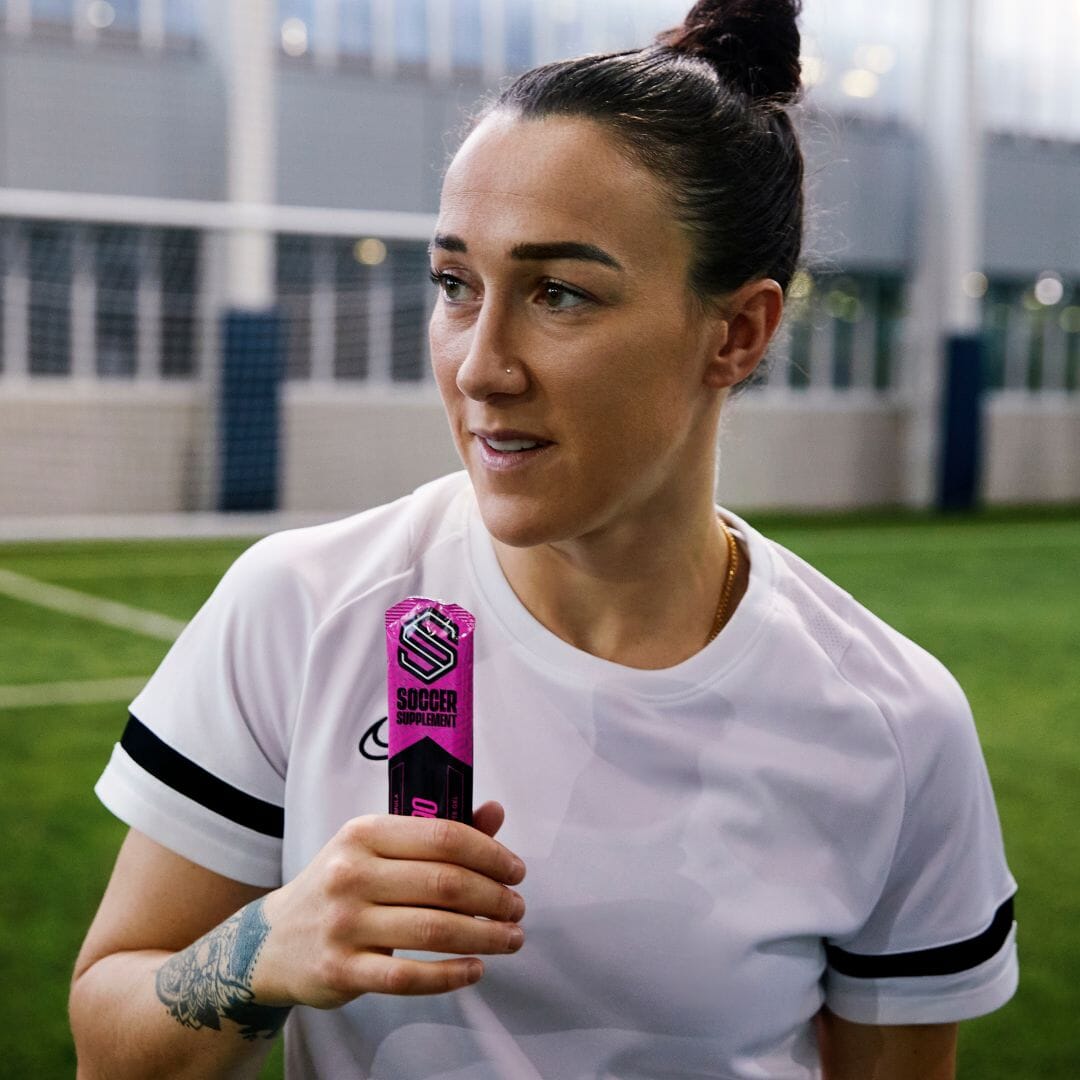Introduction
In this post we look at post-match football nutrition; what to consume following a game in order to start your recovery and to be ready for the next game or training session.
The correct nutrition is incredibly important following a match or training in order to start your bodies recovery and to assist with its adaptation.
The aerobic energy system is highly taxed during a football match, with average and peak heart rates around 85% and 98% of maximal values, respectively, corresponding to average oxygen uptakes of around 70% of maximum.1 Furthermore, the typical distance covered by a top-level, outfield player during a match is 10–13 km.2
Due to such demands of match play, it has been observed that players that start the game with normal muscle glycogen levels (~100 mmol/kg wet weight) have low muscle glycogen levels (10 mmol/kg wet weight) at the end of the game, with a significant number of muscle fibres depleted, or partly depleted of glycogen, by that time.3 As such, muscle glycogen/carbohydrate is the most important substrate for energy production for football players. This depletion of muscle glycogen, combined with net fluid and electrolyte losses (during a 90-minute match) of approximately 1.1L and 110 mmol/L (sodium, 49; potassium, 6; chloride, 43)4, in addition to exercise-induced muscle damage,5 seems to explain why fatigue occurs toward the end of a game.
Therefore, appropriate strategies to support players’ recovery from training and matches are fundamental to a team’s overall ability to consistently perform at a high level. Such post-match football nutrition practises can be summarised as three “Rs”
1. Rehydrate (fluid)
2. Replenish muscle glycogen (carbohydrates)
3. Repair damaged muscle tissue and promote exercise adaptation (protein)
In the rest of this article, we will go through how you can implement each of these three principles for football nutrition to fully take advantage of the post-match/training period.
1. Rehydrate
Rehydrating involves consuming fluid to achieve fluid balance. Unlike food intake, fluid requirements can vary massively from person to person, making it impossible to recommend clear daily fluid intake goals. With all the research that has looked into fluid requirements, simply drinking according to thirst will generally ensure that you’re consuming enough fluid each day.6
An accurate method to determine fluid requirements after training or a match is to weigh yourself before and after; the difference (minus what you drank) will pretty much represent how much you’ve sweated. Then, you should replace every kg lost through sweat with approximately 1.5 litres of fluid. It is important not to gain weight during a training session or game as this will mean you’re drinking too much and will increase the risk of exercise-associated hypornatremia (EAH), which is a dilution of your blood sodium.7 Running through a quick example, if you lose 0.8kg over the course of a game, it would mean that you’ve sweated about 800ml and would then need to replace the fluid lost with 1200ml of a desired beverage.
If you are a particularly salty sweater and can see salt crystals on your clothing after training/matches, eating a salty snack or using our Hydrate90® drink will help you replace electrolyte losses during exercise.
2. Replenish
In terms of replenishing the body’s carbohydrate stores after a match, the type of carbohydrate and the timing of when it’s eaten play a significant part in how quickly glycogen stores are refilled. For example, delaying the carbohydrate intake by two hours, as opposed to immediately after exercise, has shown to result in a 45% slower rate of carbohydrate replenishment at the four-hour mark.8
In the context of sports nutrition, carbohydrates are typically classified by their Glycaemic Index (GI). GI refers to a food’s ability to raise blood sugar, which usually dictates the subsequent insulin response. Owing to their greater insulin response, high GI foods such as white rice and white pasta tend to replenish glycogen stores faster than low GI foods such as brown rice and whole-wheat pasta. However, this emphasis towards high GI doesn’t seem to be warranted, as food sources of moderate GI have been shown to perform equally well to high GI sources. For example, Blom and colleagues demonstrated that table sugar (medium GI) and glucose (high GI), replenished muscle glycogen to a similar degree when ingested at two-hour intervals immediately after exercise.9
Does post-match GI really matter?
The whole idea of quickly replenishing muscle glycogen is only really necessary if you plan on training more than once per day. As such, troubling yourself with the timing and GI of a post-match meal would be important only in this scenario, which is unlikely for most footballers. For most of you, who train once per day at most, the speed of glycogen replenishment isn’t so important, meaning that GI is a non-issue. Under such conditions, the only thing worth concerning yourself with is eating enough total carbohydrate within the given day, since levels of muscle glycogen will be similar 24-hours post-match regardless of a food’s GI and specific timing of your meals. So, unless you’re training more than once per day, there is no need to get hung up on post-match GI: let your individual preference dictate the type of carbohydrate you eat at this time.
How many carbs do I need?
If training twice per day, then opting for meals containing 0.5-1g/kg of body weight of medium or high GI carbohydrate, every hour immediately after training, for two to three hours is a good starting point.
Using a 70kg male as an example, this would equate to 35-70g of carbohydrate, which could be achieved by eating about 50-100g (uncooked weight) of rice or pasta, 45-90g of raisins or 1-2 servings of our Hydrate90® drink or Fuel90® gel.
When the speed of glycogen replenishment isn’t of concern, the focus should be on hitting a specified carbohydrate intake for the day, with the type and timing of carbohydrate post-match being a secondary concern.
3. Repair
Repairing involves consuming an adequate amount of protein to stimulate muscle protein synthesis (MPS). MPS is the process of using proteins to repair and manufacture new proteins for muscle growth and recovery.
Timing and type of post-match protein
It has been shown that even a modest meal containing 37g of protein, 75g carbohydrate and 17g of fat (the equivalent of a medium-sized bowl of spaghetti bolognese) is still releasing nutrients into the bloodstream at least five hours later.10 So, in reality, as long as a decent pre-match meal is consumed within close proximity to training or a match, there is no real need to down a protein shake as fast as possible after it.
Since a pretty standard meal will maintain the body in an anabolic state for roughly five or more hours, then a conservative approach would be not to allow more than four to five hours to pass between the pre- and post-training/match meals. For example, a 90-minute training session would leave feeding windows of roughly 75-105 minutes on either side of the training session in which to consume protein-containing meals or snacks.
In terms of the type of protein to consume, the research has yet to tease out what might be best. Although liquid sources such as our whey protein offer greater convenience, as well as being cheaper than foods such as chicken and beef, they aren’t essential. Getting an ample amount of high-quality protein in at each meal and by the end of the day is the most important factor.
How much is enough?
The anabolic effects of a single meal are maxed out at roughly 20-40g of a high-quality protein source such as meat, poultry, eggs or dairy.11,12 As such, a conservative guideline regardless of the training goal would be to aim for at least 30-40g of protein in the post-match window, with the higher intake for larger individuals among you. 40g of protein equates to roughly one and a half chicken breasts, six whole eggs or a single serving of our Whey90®. Moderately exceeding this amount will have few negative consequences, but failing to reach these values may compromise long- term training adaptations.
If you want to learn more about nutrition for football take a look at our pre-match and during-match nutrition guides.
Joseph Agu MSc.
Science Director
Soccer Supplement ®
Click here to shop our range of Footballer Performance Supplements
References
1. Krustrup, P., Mohr, M., Ellingsgaard, H. & Bangsbo, J. Physical demands during an elite female soccer game: Importance of training status. Med. Sci. Sports Exerc. 37, 1242–1248 (2005).
2. Di Mascio, M. & Bradley, P. S. Evaluation of the most intense high-intensity running period in English FA premier league soccer matches. J. Strength Cond. Res. 27, 909–15 (2013).
3. Krustrup, P. et al. Muscle and blood metabolites during a soccer game: Implications for sprint performance. Med. Sci. Sports Exerc. 38, 1165–1174 (2006).
4. Maughan, R. J., Merson, S. J., Broad, N. P. & Shirreffs, S. M. Fluid and electrolyte intake and loss in elite soccer players during training. Int. J. Sport Nutr. Exerc. Metab. 14, 333–346 (2004).
5. Proske, U. & Morgan, D. L. Muscle damage from eccentric exercise: Mechanism, mechanical signs, adaptation and clinical applications. Journal of Physiology 537, 333–345 (2001).
6. Noakes, T. D. Is drinking to thirst optimum? Ann. Nutr. Metab. 57, 9–17 (2011).
7. Cotter, J. D., Thornton, S. N., Lee, J. K. & Laursen, P. B. Are we being drowned in hydration advice? Thirsty for more? Extrem. Physiol. Med. 3, 18 (2014).
8. Ivy, J. L., Katz, A. L., Cutler, C. L., Sherman, W. M. & Coyle, E. F. Muscle glycogen synthesis after exercise: effect of time of carbohydrate ingestion. J. Appl. Physiol. 64, 1480–5 (1988).
9. Blom, P. C., Høstmark, A. T., Vaage, O., Kardel, K. R. & Maehlum, S. Effect of different post-exercise sugar diets on the rate of muscle glycogen synthesis. Med. Sci. Sports Exerc. 19, 491–6 (1987).
10. Capaldo, B. et al. Splanchnic and leg substrate exchange after ingestion of a natural mixed meal in humans. Diabetes 48, 958–66 (1999).
11. Moore, D. R. et al. Ingested protein dose response of muscle and albumin protein synthesis after resistance exercise in young men. Am. J. Clin. Nutr. 89, 161–168 (2009).
12. Macnaughton, L. S. et al. The response of muscle protein synthesis following whole-body resistance exercise is greater following 40 g than 20 g of ingested whey protein. 4, 1–13 (2016).














